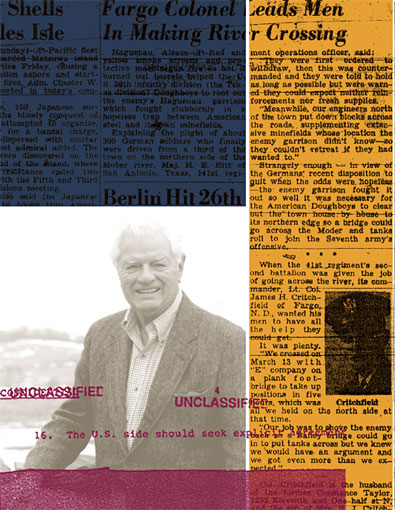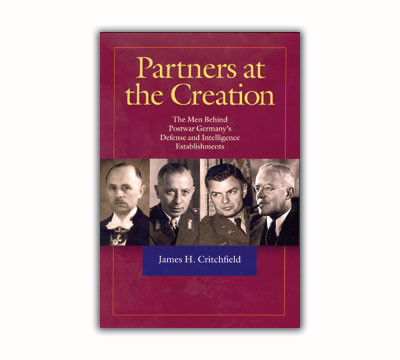
When Jim and Lois Critchfield built their new home near the mouth of Virginia's James River across from Colonial Williamsburg, Critchfield christened his boat Tinker Tailor. Fans of mystery writer John LeCarre would know instantly that the other half of that book title was Soldier, Spy. Those two words pretty well summed up the 60-plus years in the life and career of James H. Critchfield after his 1939 graduation from North Dakota Agricultural College.
Critchfield died at Williamsburg, Va., April 22, of complications from pancreatic cancer. He was buried with full military honors a month later at Arlington National Cemetery. What transpired over the intervening decades would constitute grist for a novel by Robert Ludlum. But perhaps not surprisingly, he was a bit uncomfortable talking about those aspects of his life that others would undoubtedly find intriguing.
A book titled "General Reinhard Gehlen: The CIA Connection" by former New Yorker writer Mary Ellen Reese contains this description how that episode of Critchfield's life began: "... It was a time of paradox. As Gehlen (Adolf Hitler's chief of eastern front intelligence) savored those unreal days, (as the war came to and end) waiting, one man ... rode past on the road far below in a noisy, battered American Jeep, leading a column of tanks that had made the trip through France. It was James A. Critchfield, a 28-year-old veteran of some of the war's bitterest fighting ....
Although neither man knew it at the time, their paths were destined to cross in the years ahead, with a profound, though initially controversial, effect on U.S. intelligence gathering and foreign policy during the ensuing post-war, Cold War era.
Here's how reporter Adam Bernstein reported it in an obituary printed April 24 in The Washington Post: "... It was his part in the early days of Cold War intelligence that most recently catapulted him to attention.
"Only in the late 1990s did the CIA begin to disclose, through an act of Congress, its collaboration with former Nazi spies in what was known as the Gehlen Organization. The network was named for Reinhard Gehlen, a German general who oversaw Adolf Hitler's anti-Soviet intelligence and became the first head of West Germany's secret service.
"For many, Gehlen's work came to symbolize the moral compromises of the United States. Mr. Critchfield, often credited with recommending the CIA's union with Gehlen, defended the work, which supplied the West with an infusion of fresh intelligence material about the Soviet Union and Eastern European countries at the start of the Cold War.

" 'During the Berlin Airlift and other vital moments, such intelligence was hard to obtain,' he (Critchfield) said.
"He added that many of the top Germans, including Gehlen, were far from Nazi ideologues and that many sympathized with those who tried to kill Hitler.
" 'I've lived with this for 50 years,' " Mr. Critchfield told The Washington Post in 2001. " 'Almost everything negative that has been written about Gehlen, in which he has been described as an ardent ex-Nazi, one of Hitler's war criminals -- this is all far from the fact.' "As the size of the Gehlen group grew to several thousand, many in the organization were reputed to be Soviet spies, former Nazis and other unsavory types used as informants and for other purposes.
" 'There's no doubt that the CIA got carried away with recruiting some pretty bad people,' Mr. Critchfield told a reporter.
"Still, he said his work helped more than hurt American intelligence..
Much later in his life, the CIA honored Critchfield with its Distinguished Intelligence Medal and the Trailblazer award "for significant early accomplishments in clandestine collection and analysis..
Critchfield had entered military service following his graduation from the 'AC as a member of the old horse cavalry. Initially, he served in such places as Ft. Meade, S.D., and Ft. Riley, Kan., ending up, still in the pre-war army, as the very young commander of an all-black squadron of cavalry soldiers.
Minus its horses, which had been replaced by tanks in preparation for a more modern war, that was the unit he took to North Africa. Much to Critchfield's chagrin, and that of his men, in whom he took great pride, while in North Africa, the 10th (black) cavalry was deactivated, and the troops dispersed to other units in preparation for the invasion of Europe..
With the invasion of southern France by Allied forces, Critchfield was by then in command of a battalion of the 141st regiment of the 36th Infantry Division (Texas National Guard). That unit continued to fight its way across France and ultimately into Germany. In addition to decorations won earlier, he received a Silver Star for gallantry in action in the Alsace-Lorraine region of northeastern France.
A citation accompanying the medal states: "On Dec. 12, 1944. About 700 Germans had infiltrated Allied lines, and then-Lt. Col. Critchfield put himself in continuous peril against enemy guns to best direct the artillery and mortar fire on the attackers..
Promoted to the rank of colonel, one of the youngest full colonels in the U.S. Army at the time, Critchfield's post-war work with Army intelligence had brought him to the attention of the fledgling CIA in 1948..
The Washington Post obituary goes on to report: "One of his first assignments was to go to Germany and assess whether to keep or end the relationship with Gehlen and his spies.
"He (Critchfield) took several facts into account before successfully recommending to his superiors that they maintain the relationship.
"First was that Gehlen had fallen out of favor with Hitler as the war progressed and had stored a trove of material on the Soviets as he foresaw the Allied victory.
"Gehlen figured the intelligence would make him useful to the Americans.
"More urgent was that Gehlen's network provided the Americans real-time surveillance of Soviet air operations during the Berlin Airlift.
"The CIA put Mr. Critchfield in charge of Gehlen, and he held that role until West Germany became an independent nation in 1955..
There were occasions, during Critchfield's "undercover" years that classmates, Ann Murphy Thornton and Orville Goplen among them, who were also working in government, reported "sightings" of someone they were fairly certain was him. But he declined to exhibit any sign of recognition..
The Washington Post account continues, "... In the 1960s, as chief of the Near East and South Asia division, he kept tabs on the Iraq coup that led to the Baath Party's rule, regarded at the time as a U.S. victory.
"He remained an active thinker on intelligence in the Middle East. In a 2001 interview with The Boston Globe, he linked the post-war spread of communism with a surge of Islamic fundamentalism and Arab nationalism today.
" 'I think that the problem of terrorism replaces the ambiguity of the communist threat,' he said."
Critchfield retired from the CIA in 1974 and launched Tetra Tech, his own engineering consulting firm, specializing in the Middle East..

Continuing to play a very active role in governmental affairs, he served as a White House energy adviser under Secretary of State Henry Kissinger and on a historical advisory committee to declassify U.S. documents about Nazi and Japanese war crimes. Along with his author/war correspondent brother, Richard, Critchfield was honored by his alma mater with the conferral of an honorary doctorate in 1986, and by the National Association of State Universities and Land Grant Colleges as NDSU's Centennial Alumnus the following year..
During the 1980s, Critchfield and Lois built a home in Fauquier County, the Virginia "horse country" where they lived until moving to the James River enclave in 1996.
"Partners at the Creation," a memoir about Critchfield's post-war years in Germany, was published in September by the Naval Institute Press. The family also has established a Middle Eastern Memorial Fund at the College of William and Mary in Williamsburg.
NDAC classmates may recall that Critchfield's first wife, Constance Taylor Critchfield, who had worked with him on the Bison Annual, was killed, along with his soon-to-be brother-in-law, David Baldwin, in a 1948 automobile-truck accident in Iowa. They were en route to meet Critchfield in Washington, D.C., following his return from Europe. Their two children, Michel and James, had remained in Fargo with their grandmother. A later marriage to Louise Mithoff Critchfield ended in divorce.
Critchfield married fellow CIA officer Lois Matthews during the mid-1970s. He is survived by her, two children from his first marriage, Michel Ann Webster of Clifton and James Critchfield Jr. of Culpeper, Va.; two children from his second marriage, Elizabeth Harding of Millwood, Va., and Thomas Critchfield of Falls Church; his sister, Peggy; and seven grandchildren.
Although he returned to North Dakota on only rare occasions after leaving in 1939, Critchfield never lost his strong sense of loyalty and affection for North Dakota. In 1997, on the occasion of his receiving the CIA's Trailblazer Award, marking the agency's 50th anniversary, he told a Forum reporter his Midwestern upbringing and NDAC education had prepared him well for his career.
"I have great respect for North Dakota," he said, "People who come from the Midwest are uniquely endowed with an attitude that serves our country well -- I've seen it a thousand times."
-- Jerry Richardson

































